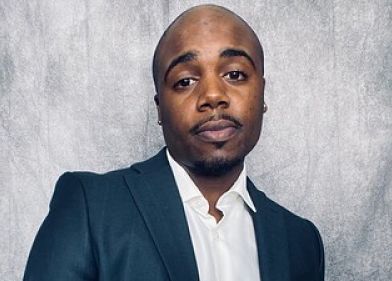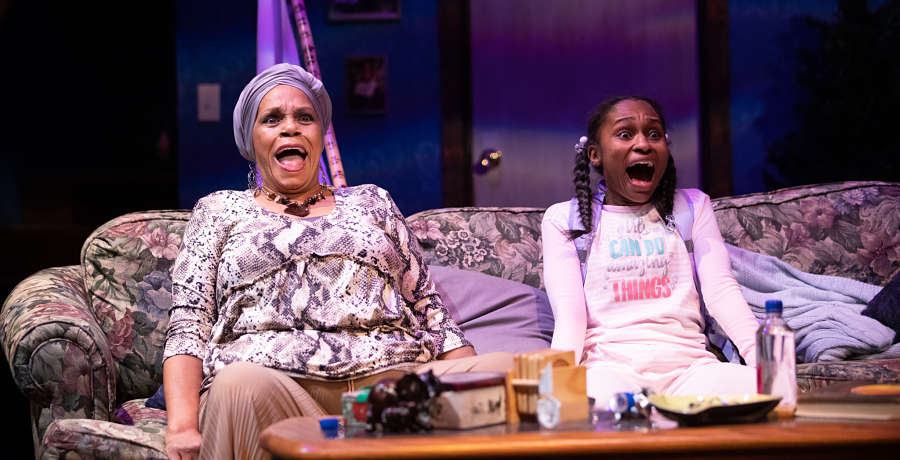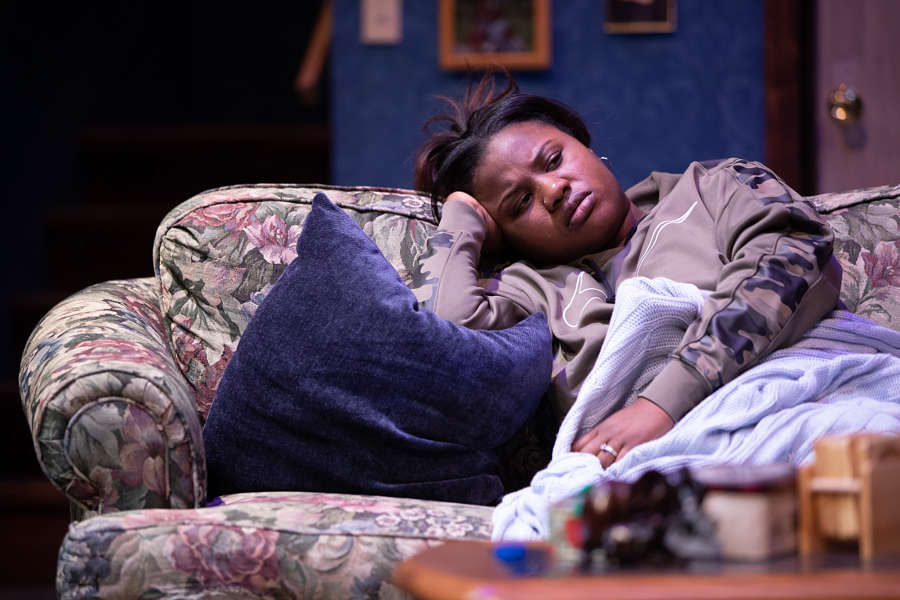The story of the Flint, Mich., water crisis is a story of environmental racism. But it is also a story about families, about perseverance, and, as the playwright of Wrong River puts it, about “looking up.”
Josh Wilder started working on Wrong River in 2014 as a student in the Yale playwriting program, as he felt not enough people were talking about the water crisis that made headlines that year. Last week Wilder’s play had its world premiere at Flint Repertory Theatre in a powerful telling centered on a young family with a 10-year-old girl experiencing lead poisoning.
The play’s highly energized opening night audience, according to artistic director Michael Lluberes (he/him), did not hesitate to talk back to the artists as they enacted scenes from the theatregoers’ own lives in a heartbreaking and breathtaking manner.
Even the next day, with a quieter, smaller audience, Flint residents said it brought back memories of what they went through in a time when their water looked like orange juice and their hands like carrots. It forced them to recall the times they couldn’t park their cars in their garages because they were filled with bottles of water, or the way they broke out in rashes if they bathed for more than five minutes.
“My skin was getting scaly,” said Kourtni Gilbert (she/her), an audience member from Flint. “My little brother had lead poisoning too.” Gilbert said she loved the show and affirmed that it reflected her real-life experiences.
Wilder, who is originally from Philadelphia, made several extended visits to Flint from 2015 forward, living in people’s homes, attending organizing meetings, and learning the stories of the people of the Michigan city (pop. 97,000). Wrong River went through seven drafts, with readings at three companies around the country, before it came home to Flint. It was the winner of the Kennedy Center’s American College Theatre Awards’ Lorraine Hansberry Playwriting Award in 2017.

And what has Wilder learned about the people of Flint? For one, that the water crisis “hasn’t stolen people’s joy. It has dimmed their spirits, but it hasn’t stolen their joy. Their grit, their pride that they are from Flint—people are survivors. It is a true testament to survival and resilience.”
This is a story written and performed by people of color, for people of color. From the recorded curtain speech to the curtain call, there is no code-switching. The story is important for everyone to see, obviously, but it doesn’t spend its time trying to explain environmental racism to white people. Instead, it shows the effect the poisoning of a city had on a family and their struggle to move forward when they are losing everything. It also unflinchingly portrays the violence people can engage in while fighting to survive the state violence inflicted on them.
Wilder first connected with Flint when Lluberes invited him to participate in a New Works Festival. Lluberes had read one of Wilder’s other plays and asked if he had anything new.
“I said, ‘Oh shit, here we go,’” Wilder recalled. “It’s like, when the universe conspires in your favor, you can’t stop it. I said, ‘Funnily enough, Michael, I have a play about Flint. It’s called Wrong River.”
He emailed the script to Lluberes and was nervous about the response; he understands that hometown pride is important.
“If you are writing a play about a city, you’d better write that damn play about the city,” Wilder said. “The people are going to really care about what you have to say about them and how you represent them onstage.”
Three weeks later, Lluberes responded that of all the plays he’d read about Flint, this was the one he wanted to produce. It became a part of that year’s new-works festival, and was then slated for a full production—which ended up being delayed because of the pandemic. But Flint Rep and its leader stood by the play. As Wilder put it, Lluberes “makes dreams come true. That’s the special thing about him. The vision this man has—the belief he has in young writers, it’s something that is sublime.”
One major change in those seven drafts occurred after Wilder met director Jeremiah Davison, a Flint native, in Atlanta.
“He walks up to me, shakes my hand and says, ‘Josh Wilder, you wrote a play about Flint. I’m from Flint,’” Wilder recalled. “He had read all my works—he really studied them and got to know them intimately. The relationship was so special to me. He actually took me to Flint. He said, ‘I want to open you up to my city. Let me show you where I’m from.’”
That visit prompted Wilder to add a crucial character.
“I got the brilliant opportunity to meet Jeremiah’s grandmother, and when I sat down and talked to her about her experience surviving the crisis, I thought, wow, I have to make sure her generation is represented in this play,” Wilder said.
Davison’s sister, Asia Turner, attended the second performance of the show, and said she not only recognized her grandmother; she also felt that the role made the play more authentic.
“I don’t know if he pulled some of that from our grandma,” said Turner, who has created her own spoken-word piece about the crisis. “Our grandmothers have had such a strong presence in our lives. That was very Flint, and very cultural.”
The role of the deceased grandmother is played by Madelyn Porter, an artistic associate at Flint Rep and a force throughout Michigan theatre, playing major roles on- and offstage for Detroit Public Theatre, Hamtramck Public School District, InsideOut, and the Michigan Opera Theatre.

“Madelyn Porter has been with the play since the reading series in January 2019,” Wilder said. “She’s a legendary actress. The fact that she affirmed my play and theme as a playwright the first day she met me, it was receiving the blessing from the community. To have a resident artist who represents the company’s values affirm her character that I wrote—it’s so humbling.”
Wilder brought other actors to the table. Curtis Morlaye, who plays the father, was the original actor in the Yale staged reading. Jade Radford, who plays the mother, was in an earlier production of the play, and she shared with Wilder how much it affected her, as she lived through Katrina as a child.
“Something said in my spirit, ‘This is the actress I want to open my play,’” Wilder said. “I kept in touch with her for five years, and when the opportunity came, I called her up and said, ‘Jade, I can’t do this play without you.’”

As Dayla, the 10-year-old poisoned by lead from the water supply, Nikyla Boxley—a graduate of the University of North Carolina’s School of the Arts School of Drama—utterly transforms her body, voice, and movements, in a stunning performance in which she calls upon a wide range of emotions, all of them completely convincing as those of a child. Wilder said it was crucial to have a child at the story center, as children will be the ones who suffer the most.
“In reality, a lot of children didn’t have agency,” Wilder said. “Their parents had agency. So she and her deceased grandmother are going to fix the water tower and save the town. That is the thing I found in the multiple drafts of the play: How do we create, visualize, and represent the effects of lead poisoning? It’s in the imagination of a child, and the curiosity of how to be active in your community politically.”
He’s not just gratified that Wrong River is the first play about the Flint water crisis to be produced in the town itself. It also bolsters his faith in the localism of theatre, he said.
“I’m glad we didn’t start in New York,” Wilder said. “I’m glad we started at the source. It goes to show you that regional theatre is where the American theatre lives.”
Bridgette M. Redman (she/her) writes about theatre and the arts for publications around the country. Her work has recently appeared in Encore Monthly, OnStage blog, the Chicago Reader and the Houston Chronicle. She’s been a theatre critic since 2005.
Creative credits for production photos: Wrong River by Josh Wilder, directed by Jeremiah Davison, with scenic design by Marie Laster, lighting design by Jasmine Williams, costume design by Kendra Babcock, sound design by Mikaela Fraser, projections design by Alison Dobbins, and stage managers Paige Conway, Patrick Ian McCall, and Katherine
Nelson


